
SUbText E-Newsletter Fall 2019
Welcome from Department Chair Charles Tung
By Dr. Charles Tung, Chair
Hello, alumni and friends of the English Department!
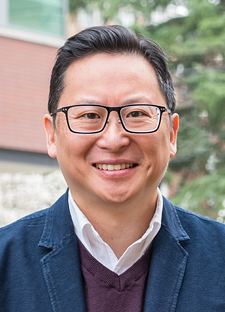 As we begin the new academic year, I’m glad to reconnect with you and reflect on 2018-19. Please know that we want to hear what you’ve been up to, and we want to increase our connections between you and our current students. Do feel free to send an email to your professors with felicitations and news of how you’re doing. We are more than willing to include that news in SUbtext—just send us a note at english@seattleu.edu! If you’re thinking about ways that you would like to support the department and its students, please do contact me at tungc@seattleu.edu. Many thanks to Dr. Allison Meyer, the editor of this newsletter and chair of our important Student Outreach Committee in English, and thanks to Shawn Bell, our admin, and the students who contributed to this year’s SUbtext!
As we begin the new academic year, I’m glad to reconnect with you and reflect on 2018-19. Please know that we want to hear what you’ve been up to, and we want to increase our connections between you and our current students. Do feel free to send an email to your professors with felicitations and news of how you’re doing. We are more than willing to include that news in SUbtext—just send us a note at english@seattleu.edu! If you’re thinking about ways that you would like to support the department and its students, please do contact me at tungc@seattleu.edu. Many thanks to Dr. Allison Meyer, the editor of this newsletter and chair of our important Student Outreach Committee in English, and thanks to Shawn Bell, our admin, and the students who contributed to this year’s SUbtext!
In this newsletter, you’ll find that our students accomplished a great deal last year, and a number of recent graduates have gone on to successful jobs or graduate schools in a variety of disciplines! It’s not hard to see why. Our students worked with Dr. Molly Clark Hillard and the organizing committee for the Northwest Undergraduate Conference on Literature in order to host this important regional conference at SU, as well as present their work. As you’ll see below in the report of acting Director of Creative Writing Juan Reyes, we hosted the Washington State Poet Laureate Claudia Castro Luna and the slam poet Daemond Arrindel as distinguished visiting writers, and Prof. Reyes involved students as interns and editors of Big Fiction magazine. Dr. Kirsten Thompson, Director of Film Studies, hosted a wide array of events for our students and community. Dr. Hidy Basta, Director of the Writing Center, conducted over 2000 consultations and also brought students to a regional academic conference to present their work. Dr. Christina Roberts, Director of the Indigenous Peoples Institute, involved students in the professional academic conference of the Native American and Indigenous Studies Association (NAISA) conference in New Zealand. We continue to value working closely with our students and creating a rich environment for academic study, professional development, and human connection. We know that these are just a sampling of the larger array of accomplishments and life paths that you and your classmates are working on.
I’ll keep this short and try to conclude by welcoming Dr. Serena Chopra, our new colleague who specializes in creative writing-poetry—check out her bio in the newsletter! Last year, we published a detailed bio of Alex Smith, Assistant Director of the Writing Center, and I’m happy to report that she is now a full-time Instructor as well. Father David Leigh retired last year, and Dr. Andrew Tadie will be retiring at the end of fall quarter, after 40 years of teaching. Our department is in the middle of the search process for a specialist in African American literature. Keep in touch!
With best wishes from your department at SU,
Charles Tung
Department News
Creative Writing Annual Update
By Professor Juan Carlos Reyes, Interim Director of Creative Writing
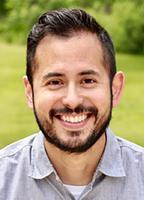 2018-2019 was an exciting year for the Creative Writing Program, as it ventured into a hiring process to find a new poet to join the program. After an exhaustive search that included many wonderful candidates, we were excited that the dynamic Dr. Serena Chopra agreed to join us. We are incredibly excited for what Dr. Chopra’s creative work and pedagogy will bring to our students and to our department.
2018-2019 was an exciting year for the Creative Writing Program, as it ventured into a hiring process to find a new poet to join the program. After an exhaustive search that included many wonderful candidates, we were excited that the dynamic Dr. Serena Chopra agreed to join us. We are incredibly excited for what Dr. Chopra’s creative work and pedagogy will bring to our students and to our department.
Amidst the work of expanding our program, Professor Juan Reyes celebrated two milestones. In winter, he was awarded the Artist Trust Gar LaSalle Storytelling Award, a statewide honor given to one fiction writer each year. As chief editor of Big Fiction, he also saw the relaunch of the magazine. Issue 8, “The Double,” arrived in March 2019, and was celebrated at a public reading at the annual Association of Writers & Writing Programs Conference (AWP) in Portland, OR. We are so proud, especially, of the undergraduate interns that contributed to the magazine, as readers, editors, and sound engineers with the magazine’s podcast. In addition, Professor Reyes designed and introduced the new “Prose & Podcast” course, a curriculum that explored how to create fiction dramas for serial radio programming.
Last year, our community also welcomed two fantastic Distinguished Visiting Writers to campus. First, the renowned poet Claudia Castro Luna taught a highly popular course called “Writing Lyric Poetry” in winter, in which she explored emotional expression through imagery, metaphor, diction, rhyme, and cadence. Shortly after her tenure here, Castro Luna was selected as the Washington State Poet Laureate, and we have fond memories of her contributions to our creative and teaching community. She was followed by a return of the ever-popular Daemond Arrindel who taught his beloved slam poetry class, a performance-based poetry adventure that culminated in a wild and wonderful student performance.
Alongside all of this programming, our program director, Dr. Susan Meyers, continued her own work as well, reimagining the ever popular “Writing the Personal Narrative” course and fulfilled two residencies, at Monson Arts and Virginia Center for the Creative Arts. She also published her essay “Visits from the Border” in the prestigious literary magazine Creative Nonfiction. In addition, she was delighted to support several students applying to graduate schools this year and pursuing careers in publishing. Congrats to our grads!
Film Studies Program Annual Update
By Dr. Kirsten Moana Thompson, Director of Film Studies
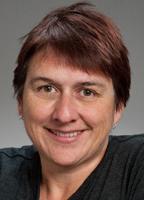 Film welcomed two new tenure track faculty Ben Schultz-Figueroa and Alex Johnston joining the team, offering new classes in Science and Film, Animals and Film and Found Footage, joining other new classes in Sound Design, James Bond, Film Festivals and Pacific Cinema. Both Dr. John Trafton and Dr. Schultz-Figueroa announced that they had secured publishing contracts for new books. Dr. Trafton's research is on Southern California visual culture at the turn of the century and L.A. as a film capital, and Dr. Schultz-Figueroa works on experimental scientific films.
Film welcomed two new tenure track faculty Ben Schultz-Figueroa and Alex Johnston joining the team, offering new classes in Science and Film, Animals and Film and Found Footage, joining other new classes in Sound Design, James Bond, Film Festivals and Pacific Cinema. Both Dr. John Trafton and Dr. Schultz-Figueroa announced that they had secured publishing contracts for new books. Dr. Trafton's research is on Southern California visual culture at the turn of the century and L.A. as a film capital, and Dr. Schultz-Figueroa works on experimental scientific films.
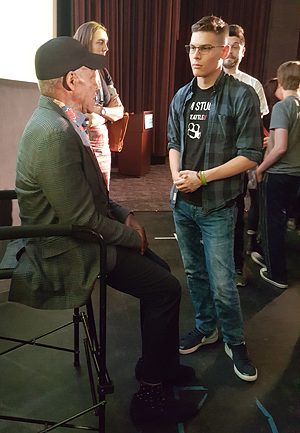 Film hosted 39 events over the year, including campus screenings with our partners the Tasveer Film Festival and the Social Justice Film Festival. Highlights included the two time Academy Award winning Filmmaker Sharmeen Obaid Chinoy's screening and discussion of A Girl in the River. In March the Society for Cinema and Media Studies Annual Conference was hosted in Seattle with over 3000 scholars attending. Three special conference events were organized by Seattle U film faculty including a panel of Northwest film practitioners moderated by John Trafton at the Egyptian Theater, a screening of one of Dr. Johnston's films at Northwest Film Forum and a discussion of ethnographic film at the Burke Museum with Dr. Schultz-Figueroa. Film started a new Professional Development series called 'Movie Bites' featuring filmmaker and producer Dan Merlino and Washington Filmworks CEO Amy Lillard in conversations with students about career pathways. Spring saw two sponsored films (Lynch, Good Kisser) and one industry panel at the Seattle International Film festival, and Danny Glover, the Executive Producer of Lynch, a documentary on race and sports turned up at one of the screenings! Finally, the large graduating class celebrated with the first awards ceremony for Film Students with new prizes and trophies given out. One of our alumni Brandon Bassler has already secured a job as a Publicity Assistant at Lifetime Television!
Film hosted 39 events over the year, including campus screenings with our partners the Tasveer Film Festival and the Social Justice Film Festival. Highlights included the two time Academy Award winning Filmmaker Sharmeen Obaid Chinoy's screening and discussion of A Girl in the River. In March the Society for Cinema and Media Studies Annual Conference was hosted in Seattle with over 3000 scholars attending. Three special conference events were organized by Seattle U film faculty including a panel of Northwest film practitioners moderated by John Trafton at the Egyptian Theater, a screening of one of Dr. Johnston's films at Northwest Film Forum and a discussion of ethnographic film at the Burke Museum with Dr. Schultz-Figueroa. Film started a new Professional Development series called 'Movie Bites' featuring filmmaker and producer Dan Merlino and Washington Filmworks CEO Amy Lillard in conversations with students about career pathways. Spring saw two sponsored films (Lynch, Good Kisser) and one industry panel at the Seattle International Film festival, and Danny Glover, the Executive Producer of Lynch, a documentary on race and sports turned up at one of the screenings! Finally, the large graduating class celebrated with the first awards ceremony for Film Students with new prizes and trophies given out. One of our alumni Brandon Bassler has already secured a job as a Publicity Assistant at Lifetime Television!
Photo: Film Studies student Kevin Cobb with Danny Glover at SIFF
Writing Center Annual Update
By Dr. Hidy Basta, Writing Center Director
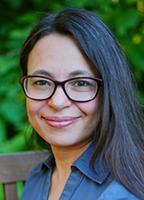 2018-2019 has been an amazing year for the Writing Center. We conducted over 2000 individual consultations, several group workshops, class visits, and study halls. The piloted online services have been successful and are now fully integrated in our staff education. Currently, students can schedule an in-person session or a virtual one. We ended the year looking forward to expanding our asynchronous consultations as well, and we are gearing up to respond to more submitted papers this winter.
2018-2019 has been an amazing year for the Writing Center. We conducted over 2000 individual consultations, several group workshops, class visits, and study halls. The piloted online services have been successful and are now fully integrated in our staff education. Currently, students can schedule an in-person session or a virtual one. We ended the year looking forward to expanding our asynchronous consultations as well, and we are gearing up to respond to more submitted papers this winter.
We have also shared our learning and scholarship in regional and national conventions. In April, Writing Consultant, Nick Stinehour presented in the Pacific Northwest Writing Center Association Conference. Nick presented a paper co-written with Olivia Roussell and Tara De Bortnowsky titled “Spill the Communitea: The Role of the Mentoring Process in Enhancing Community.” In May, Dr. Hidy Basta presented on “The Multilingual Turn in Tutor Education” at the Canadian Writing Center Association in Vancouver, BC.
Although the graduation and hiring cycles are predictable in Writing Center work, it has been difficult to send off our fourteen graduating seniors. Shout out to the wonderful class of 2019!! We wish them all the best in their career adventures.
At the end of spring, we welcomed a new cohort of Writing Consultants and Office Assistants with a wide disciplinary representation in Business, English, Psychology, Theater, Journalism, Theology, Communication, Political Science, Engineering, and Interdisciplinary Liberal Studies. We have also celebrated Assistant Director Dr. Alex Smith’s completion of her dissertation.
We are looking forward to what the coming year may bring. Stay tuned with our news, events, and update on our webpage,FB,and Instagram, @suwritingcenter.
Thoughts Upon the Retirement of Fr. David Leigh, S.J., Ph.D.
By Dr. Mary-Antoinette Smith, Associate Professor of English
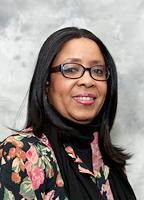 Last spring Fr. David Leigh, S.J., retired from our English Department, and it is one of the pleasures and highlights of my career to write this tribute about the man who has influenced and inspired my life for more than two decades. At his retirement gathering I opened my remarks with an epigraph from Epistle IV of Alexander Pope’s Essay on Man, which states: “Thou wert my guide, philosopher, and friend . . .” because I could not think of a more suitable way to characterize his many influences, not just on me, but on all he encounters, whether we be faculty, staff, students, community members, parishioners, or Jesuit brothers with whom he engages locally, nationally, and around the world.
Last spring Fr. David Leigh, S.J., retired from our English Department, and it is one of the pleasures and highlights of my career to write this tribute about the man who has influenced and inspired my life for more than two decades. At his retirement gathering I opened my remarks with an epigraph from Epistle IV of Alexander Pope’s Essay on Man, which states: “Thou wert my guide, philosopher, and friend . . .” because I could not think of a more suitable way to characterize his many influences, not just on me, but on all he encounters, whether we be faculty, staff, students, community members, parishioners, or Jesuit brothers with whom he engages locally, nationally, and around the world.
My personal experience with Fr. Leigh began when I came to Seattle U as a graduate student from the University of Southern California to present a paper at the Conference on Christianity and Literature in 1992. While here, my hometown of Los Angeles was erupting in rioting “following the acquittal of police officers charged with excessive force in the beating of Rodney King” and I was deeply concerned about family, friends, and the state of my hometown throughout the three-day conference. Under Fr. Leigh’s insightful and prayerful stewardship as conference chair, however, all attendees felt calmed and reassured that all would be well in L.A. as we continued along with our proceedings. I was so impressed at the time with the spirit of kindness, concern, and solidarity expressed by Fr. Leigh, the conference delegates, and the faculty, staff, and students across campus. There were spontaneous prayer vigils calling for justice and the restoration of peace for residence of Los Angeles (particularly those of the Black community), and I was awestruck by the caliber of cura personalis and social justice advocacy-in-action that I witnessed throughout those days, and Fr. Leigh was at the helm. As I prepared to return home, I recall thinking that Seattle University would be a wonderful place to work. And it has been, especially because of the presence of Fr. Leigh and the ways he embodies our university ethos as a person for others who promotes inclusive excellence as a stellar colleague in and representative of our English Department.
It is with a mix of excitement for his future as a retiree and twinges of sadness that our department has said farewell to Fr. Leigh. Doing so has given us pause to look back upon his academic career, one that is indeed distinguished. He earned a B.A. in Classics (1961), an M.A. in English (1963), and a Lic Phil in Philosophy (1962) from Gonzaga University, an M.A. and Lic Theology (1969) from Regis College, Toronto, and a Ph.D. in English (1972) from Yale University (1972). He joined the faculty at Gonzaga University in 1972, where he taught for eleven years and earned tenure before joining our English Department in 1983. During his thirty-six year career at Seattle U he has distinguished himself as an active scholar, as an indefatigable contributor in the area of service, as an all-around campus and community leader, and as a dedicated teacher, a devotion for which he was bestowed the Alumni Teaching Award. In addition to teaching English courses in our department, he has also taught University Core and University Honors courses, and the topics of his classes are broad and interesting, including: British Literature, American Short Story, Gothic Literature, Greek Literature in Translation, Law and Literature, Spiritual Autobiography, Apocalyptic Fiction and Film, The Russian Novel, C.S. Lewis, The Bible as Literature, Creative Non-Fiction, Thomas Merton, Senior Synthesis, and more.
Concurrent with teaching, Fr. Leigh has a remarkable record of research. He is the author of two academic monographs with prominent university presses, Circuitous Journeys: Modern Spiritual Autobiography (NY: Fordham U Press, 2000) and Apocalyptic Patterns in Twentieth-Century Fiction (U. of Notre Dame Press, 2008), and he is currently trying to finish another book manuscript, as well as several articles and conference papers. He has also published more than twenty articles in respected journals and chapters in books and has given dozens of conference presentations. He has also served the profession as the Editor in Chief of the Ultimate Reality and Meaning journal, as a member of the board of Christianity and Literature, and as the host of the Western Regional Meeting of the Christianity and Literature Conference held at Seattle University. In light of his impressive past publication record, we are delighted that Fr. Leigh is currently working full-time on a book about spirituality and literature and we look forward to its publication along with his future forthcoming writings.
In honor of Fr. Leigh’s impressive record of teaching, research, and incalculable service to our campus, our local community, and the profession, it was a joy for our department to celebrate his many accomplishments at his spring retirement gathering. He was deeply grateful for the showering of accolades offered by our current chair, Dr. Charles Tung, colleague and Director of Writing Studies, Dr. June Johnson Bube, our Professors Emeriti, Dr. Hamida Bosmajian and Dr. John Bean, our university President Fr. Steve Sundborg, our college Dean, Dr. David Powers, and other colleagues across campus. With characteristic humbleness, Fr. Leigh offered his own remarks at the end of our celebratory tributes, giving profound thanks to us all while noting that (all accolades aside) what meant the most to him was the degree to which real people shared real and meaningful comments from the heart. Among these remarks was the poem our own Dr. Sharon Cumberland, Professor Emerita, wrote, read, signed, and presented in a beautiful frame to Fr. Leigh, which reads as follows:
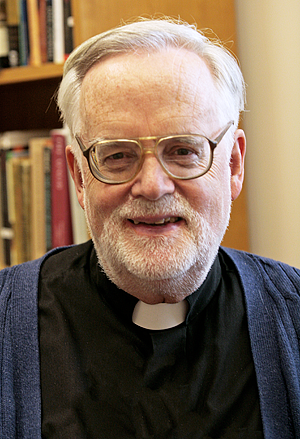
LATER WORKS
A poem for David Leigh, S.J.
On the occasion of his retirement
from the Seattle University
English DepartmentSee those leaves? They take so long
to flourish—to green,
to feed the tree with sunlight,
holding up nests while blue
eggs crack into robins,
and busy squirrels
scramble in sweet air.See how the leaves scatter shade
over rough ground?
Whipped in storms,
they hold steady on the branch.
Apple blossoms burgeon
to fruit in their arms.
No one knows how many
flowers have unfolded there,
or how many seeds flew away
to make groves of their own.Now see the leaves grow spotted,
turn to silver,
float slowly to earth.
They have more to spend,
resting on the grass,
nourishing the turning world
as new leaves reach above us.Now we work at the fundament:
to feed roots, amend soil, supply
the crow and rabbit,
the pears and plums,
holly berries, Easter lilies.
We uphold that rascal squirrel
and shelter the raccoon. We applaud
the racketing Stellar’s Jay,
as we turn skyward, facing the light.
As Fr. Leigh faces the light and brightness of his future as a retiree, we bid him well as he ventures forth into his future. And, as I personally say farewell to the man who made my career at Seattle University possible, I recall with fondness an anecdote he frequently used to share at our annual Senior Retreat, in which he said that as a youthful teen he often pondered whether to become a doctor, or a priest; a lawyer, or a priest; a firefighter, or a priest, and ultimately he discerned that the constant in all of these ponderings was “becoming a priest” . . . Consequently, he took the road the led to his becoming a Jesuit priest and a Professor of English Literature.
On behalf of our English Department members who deeply value Fr. Leigh as a treasured colleague, and with reference to Robert Frost’s The Road Not Taken (one of his favorite go-to poems for Ignatian discernment) we are so thankful that he chose the road that led to us, for “that has made all the difference” for the faculty, staff, students, conference delegates, scholars across the globe, retreatants, and all of the many people for whom he has been so dedicated and influential throughout his career as a priest, teacher, scholar, and person for others.
The English Department Welcomes New Faculty this Fall
Creative Writing Professor Dr. Serena Chopra
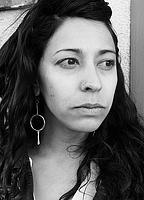 Professor Serena Chopra comes to us from Denver, Colorado where she previously taught at Naropa University in the MFA Creative Writing program (The Jack Kerouac School of Disembodied Poetics) and in the MFA Performance Studies program. Originally from Denver, Serena earned her MFA from the University of Colorado at Boulder and her PhD from the University of Denver. She is a writer, dancer, filmmaker, soundscape designer and a visual/performance artist and brings her love for engaging multiple mediums and disciplines into the classroom.
Professor Serena Chopra comes to us from Denver, Colorado where she previously taught at Naropa University in the MFA Creative Writing program (The Jack Kerouac School of Disembodied Poetics) and in the MFA Performance Studies program. Originally from Denver, Serena earned her MFA from the University of Colorado at Boulder and her PhD from the University of Denver. She is a writer, dancer, filmmaker, soundscape designer and a visual/performance artist and brings her love for engaging multiple mediums and disciplines into the classroom.
In 2016-2017 Serena lived in India as a Fulbright Scholar, where she researched how queer Indian women and female-assigned non-binary folks mediated social and religious tradition with their radical identities and how they subsequently articulated narratives of desire, love, and family despite having little to no sociopolitical representation. From this experience Serena and her wife, Kasey, made a film, Dogana/Chapti (2018), which won ArtHyve's Archives as Muse Film grant at the Denver Film Festival and was Official Selection at Frameline43 (San Francisco, CA), Oregon Documentary Film Festival, Seattle Queer Film Festival, Nahia Film Festival (Granada, Spain) and Cinema Diverse (Palm Springs, CA). Professor Chopra has two books of poetry, This Human (Coconut Books 2013) and Ic (Horse Less Press 2017). Her hybrid film/critical essay on the feminist poetic line, Mother Ghosting (2018), will be published this fall in the inaugural edition of Belladonna Press’ journal, Matters of Feminist Practice. She is currently working on a filmic installation titled Ololyzo with poet Alicia Mountain, Director Amanda Madden and Producer Kasey Ferlic. The film is a contemporary adaptation of Monique Wittig’s 1969 feminist poetic novel, Les Guérillères, and will explore and empower the illegibility of contemporary queer activism. Ololyzo will run as an immersive film installation in Understudy Denver in September 2020 as part of the art space’s month-long artist residency program.
Serena’s current writing project is a hybrid family memoir on epigenetic trauma and ancestral haunting, centering on her grandmother and father (both from Punjab, India). The book examines the paradoxes of undiagnosed mental illness, domestic abuse, immigration and growing up with foreign and burdened ghosts on the American Great Plains.
Dr. Chopra loves teaching Queer Literature and Poetics, Documentary Poetry and Poetics, Divinatory Poetics, Modern and Postmodern Poetry and Poetics, Minoritarian Poetry and Poetics, and Creative Writing, especially poetry, poetic memoir and hybrid/interdisciplinary forms. She is looking forward to sharing her love and urgency for creative expression with students and is honored (and so happy!) to be part of an intellectually robust faculty composed of incredibly compassionate, welcoming and warm colleagues.
Serena loves writing on rainy days, making chai, eating ramen, reading tarot, drinking wine with her cat, talking with friends over whiskey, watching films and being on the beach. Serena and her wife are always up for adventure and particularly enjoy backpacking, hiking, kayaking, long days in the sun and weekends full of dancing.
Departmental Honors
By Dr. Molly Clark Hillard, English Departmental Honors Coordinator
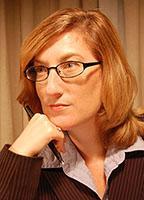 The English Department Honors Program, coordinated by Dr. Molly Clark Hillard, had a fun and productive year together.
The English Department Honors Program, coordinated by Dr. Molly Clark Hillard, had a fun and productive year together.
The 2018-2019 cohort included six English Departmental honors students.
In winter of 2019, they took a class called Directed Readings, which prepared them for the work of the thesis. First, they read a shared set of critical essays that solidified understanding of both past and present discourses on academic topics and creative genres, styles, and movements. These essays showed students how to modify their searches and engage the history of ways of approaching their critical or creative problem. Next, they engaged in guided visits to the Seattle U library and its special collections, as well as to University of Washington’s Suzzallo library, which helped them refine their research and creative plans. Through intensive writing exercises that tapped into both creative and critical processes, they honed their project descriptions, created annotated bibliographies, and worked through an outline of the project as a whole. Finally, they worked through strategies for long-form writing and presenting work to an audience.
At the end of winter quarter, four Departmental Honors students (and other students in the department) presented work on March 23 at the Northwest Undergraduate Conference on Literature, held this year on the Seattle U campus for the first time in its 16-year duration. Tira McGavin, Kennedy Dresh, Amanda Fawcett, and Amy Gulley all did absolutely beautiful work, and presented with great poise and professionalism. Additionally, Amanda Fawcett won the Brass NUCL (“hardest-hitting essay") this year for her essay titled "West African Diaspora in Yaa Gyasi’s Homegoing and Marvel’s Black Panther"!
In May of 2019, all six English Department Honors students presented their Honors projects at the Seattle University Undergraduate Research Association conference (SUURA), the university’s interdisciplinary research conference.
The students and their faculty mentors were:
Sena Crow/Dr. Christina Roberts
Tara de Bortnowsky/Dr. Mary-Antoinette Smith
Kenedy Dresh/Dr. Charles Tung
Amanda Fawcett/Dr. Kate Koppelman
Amy Gulley/Dr. Susan Meyers
Tira McGavin/Dr. Molly Clark Hillard
Honors students were celebrated for completing their theses at the College of Arts and Sciences annual awards ceremony.
In 2019-2020, Dr. Nalini Iyer will temporarily coordinate the Honors program while Dr. Hillard is on sabbatical.
Departmental Honors students often go on to graduate school, teaching, and other exciting forms of work. We’d love to hear your story of where you are in your life and work now. Please email us so that we can share your good news!
A Third Successful Year for the Study of the U.S. Institute on Contemporary U.S. Literature
By Dr. Charles Tung
This year we had the pleasure of hosting our third Study of the US Institute on Contemporary US Literature, a six-week Fulbright-related program that brought scholars and educators to Seattle University. Our colleagues came from Mexico, Brazil, Togo, Cameroon, Algeria, Tunisia, Lebanon, Turkey, Portugal, France, Belarus, Finland, Uzbekistan, Tajikistan, India, Nepal, Mongolia, and China.
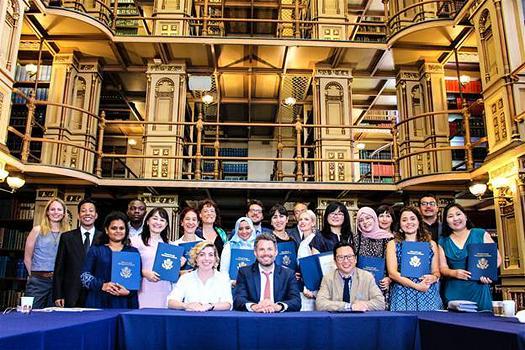
SUSI Certificate Ceremony in the Riggs Library, Georgetown University, DC.
A number of Seattle U faculty led seminars: Dr. Christina Roberts on Deborah Miranda’s Bad Indians; Dr. Nalini Iyer on Ayad Akhtar’s Disgraced; Dr. Ken Allan on American art from WWII to the present; Dr. John Bean and Dr. June Johnson Bube on course design and curriculum revision; and Dr. Susan Meyers, Seattle Civic Poet Anastacia-Reneé Tolbert, and Washington State Poet Laureate Claudia Castro Luna read from their work and spoke about creative writing. Additionally, we enjoyed seminars led by 14 professors from other universities. The SUSI will be on pause for a year, but Dr. Tung will reapply for the grant after that. Read more about the 2019 Institute here: https://www.seattleu.edu/artsci/about/news/news-2019/third-study-of-the-us-institute-for-scholars-on-contemporary-american-literature.html
SUURJ Launches Volume 3

By Falen Wilkes, Lauren Lee, and Theresa Mercer (student editors of SUURJ Vol 3)
A dedicated team of ten students launched the third volume of Seattle University’s Undergraduate Research Journal (SUURJ) in June of 2019. The student editors worked with Seattle University students, faculty, and administrators to bring together a new issue of this online, open-access journal that amplifies our student’s voices and insights beyond the classroom into wider conversations, and also provides students, both authors and editors, with valuable professional experience.
This year’s volume is an exciting collection of student research ranging among the disciplines of anthropology, art history, business ethics, communications, economics, international studies, literature, and psychology. Each year’s selection is the result of a careful process that seeks to balance disciplinarily and methodologically diverse content with relevant, compelling interventions. While SUURJ does not choose annual themes for its volumes, natural patterns and rhythms do occur. This year we saw emphases on mental health and the body, on the responsibility of institutions to take care of their constituents, and on the extent to which our cultural artifacts do or do not endorse feminist practice.
While what Dr. Hillard brings to SUURJ as Chief Faculty Editor will certainly be missed while she is on sabbatical this year, she has organized the journal with a precision that ensures its structural longevity without compromising the individual adaptations of each new team of editors. In 2020, we are excited to see the work that Professors Hannah Tracy and Tara Roth will bring to Volume 4, in light of the journal’s continued expansion. Volume 3 is our biggest volume to date; we had more submissions, accepted papers, student editors, authors, and faculty content editors than ever before. It is, without a doubt, the drive of inspired community members that have fueled the need for undergraduate research journals and created, for students across disciplines, an impactful platform. The need for diverse voices is crucial, and it is our hope to elevate those voices in order to provoke and motivate others.
To read SUURJ Volume 3, click here.
Northwest Undergraduate Conference in Literature (NUCL) at Seattle University
By Elena Selthun and Hana Kirchoff (student interns for NUCL 2019)
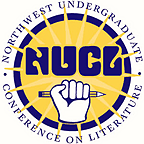 On March 23, 2019, Seattle University had the honor of hosting The Northwest Undergraduate Conference on Literature, or “NUCL,” for the first time as guest organizers. NUCL was founded at the University of Portland in 2004 and has been hosted there by the UP English Department for the past 15 years, where it has long enjoyed and deserved its excellent reputation among regional universities and high schools. The conference celebrates the literary passion and dedication of undergraduates and a few outstanding high school students. In 2019, we received the highest number of applications in NUCL history, and welcomed approximately 100 attendees from universities and high schools throughout the West, including 77 presenters, to the daylong conference at SU. The English department also collaborated with Lemieux Library to host a curated viewing of items from Special Collections, including a medieval illuminated manuscript and our first edition volume of Charles Darwin’s Origin of Species.
On March 23, 2019, Seattle University had the honor of hosting The Northwest Undergraduate Conference on Literature, or “NUCL,” for the first time as guest organizers. NUCL was founded at the University of Portland in 2004 and has been hosted there by the UP English Department for the past 15 years, where it has long enjoyed and deserved its excellent reputation among regional universities and high schools. The conference celebrates the literary passion and dedication of undergraduates and a few outstanding high school students. In 2019, we received the highest number of applications in NUCL history, and welcomed approximately 100 attendees from universities and high schools throughout the West, including 77 presenters, to the daylong conference at SU. The English department also collaborated with Lemieux Library to host a curated viewing of items from Special Collections, including a medieval illuminated manuscript and our first edition volume of Charles Darwin’s Origin of Species.
At NUCL, developing scholars had the chance to practice public speaking, experience the flow of an academic conference, and engage with the scholarly work of their peers across the country. Yumi Wilson of Lewis and Clark College, winner of the best creative submission, expressed that NUCL “was a wonderful experience, being able to meet so many different voices at once.” SU's Amanda Fawcett also gleaned a lot from her experience at NUCL: “as a critical writer, it is easy to feel isolated…[at NUCL], I realized that I am not alone and that my thoughts have a role in the larger society around me.” Invariably, NUCL 2019 was a valuable experience for both undergraduate and high school panelists in their academic and professional development.
In addition to featuring exciting panels such as “Consequential Chaucer,” and “Writing Form, Forming Writers,” NUCL 2019 also featured panels exclusively for creative nonfiction, fiction, and poetry readings. NUCL also grants awards in four categories: best high school submission, best creative writing submission, best critical essay, and the “Brass NUCL Award.” The Brass NUCL is annually presented to the hardest-hitting paper, one that offers not only rich arguments and deft language, but also points to a literary text’s urgent relevance to our world today. Amanda Fawcett, a senior in the SU English Department, was awarded the Brass NUCL award for her inspiring essay that reimagined the spectrum of African and African American identities and the impact of the Atlantic slave trade in texts as various as Yaa Gyasi’s novel Homegoing and the Marvel film Black Panther.
NUCL 2019’s Keynote Speaker was Dr. Dorothy Kim, a distinguished scholar who teaches Medieval Literature at Brandeis University. Dr. Dorothy Kim’s keynote speech addressed the significance of alt-right groups appropriating medieval culture in order to instill fear. Many panelists found that Dr. Kim’s speech was relevant to issues in their daily lives and in their writing.
The success of Seattle University’s first NUCL would not have been possible without the NUCL team, which included three English major student interns; Natalie Langdale, Hana Kirchoff, and Elena Selthun. The NUCL interns collaborated with Committee Chair Dr. Molly Clark Hillard to advertise NUCL with flyers, letters, and email blasts. Once certain that people would be attending the event, the assistants got to work on designing and ordering the conference supplies, as well as putting together the program and assembling exciting panels with our deliberations committee. In addition to committee chair Dr. Hillard, the NUCL committee included Dr. María Bullón-Fernández, Dr. Charles Tung, Dr. Allison Machlis Meyer, Dr. Bryn Gribben, and Dr. Alex Smith. Many other members of the English Department were also involved in the success of the conference, especially in the deliberations and awards process, as well as panel creation and moderation. As this was SU’s first year hosting NUCL, the event coordination process was greatly assisted by the veteran organizers in the University of Portland English Department, particularly Dr. Molly Hiro and Dr. Joshua Swidinski.
Featured Alumnus: John Englehardt
By Elena Selthun (2021)
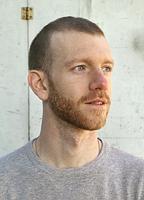 John Englehardt graduated from Seattle University with a B.A. in English/Creative Writing in 2009, and received his MFA from the University of Arkansas in 2014. He has won numerous literary awards, including the Wabash Prize in Fiction, The Stranger’s A&P fiction contest, and The Conium Review’s 2014 flash fiction contest. John’s work has been published in The Southern Review, Sycamore Review, Vol. 1 Brooklyn, Moss, Monkeybicycle, and The Seattle Review of Books. His first novel, Bloomland, is the winner of the 2018 Dzanc Prize for Fiction.
John Englehardt graduated from Seattle University with a B.A. in English/Creative Writing in 2009, and received his MFA from the University of Arkansas in 2014. He has won numerous literary awards, including the Wabash Prize in Fiction, The Stranger’s A&P fiction contest, and The Conium Review’s 2014 flash fiction contest. John’s work has been published in The Southern Review, Sycamore Review, Vol. 1 Brooklyn, Moss, Monkeybicycle, and The Seattle Review of Books. His first novel, Bloomland, is the winner of the 2018 Dzanc Prize for Fiction.
During John’s time at SU, he completed an honors thesis, published work in Fragments, and served for two years as co-president of the Literary Society. After graduation, John got a spot in the MFA program at the University of Arkansas, as well as a teaching fellowship which allowed him to begin working as an instructor a year after graduation. According to John, his experience at SU shaped “who [he] wanted to be as an instructor,” and he aimed in his teaching to “emulate the rigor, care, and professionalism [he] had witnessed as a student” in the English Department.
In particular, John was inspired by his close work with Dr. Weihe and “his vision of writing as a task that is opposed to certainty and ideology…its strength is to cast doubt on things we take for granted, to observe, and be comfortable existing within uncertainty.” Other sources of inspiration from his SU experience include Wes Howard-Brook’s class on liberation theology, focusing on “ideas of empire and solidarity,” reading The Canterbury Tales using “feminist and psychoanalytic lenses” with Dr. Koppelman, Dr. Wirth’s critiques of western metaphysics, and studying Neuromancer and Jorge Luis Borges in Dr. Tung’s Literary Theory course. John has also found inspiration in more unlikely places: he worked for four years as a carpenter in the drama department’s scene shop, an experience that taught him about the elements of good storytelling in any form. He also believes in the importance of personal exploration of literature: after reading T.S. Eliot’s The Waste Land on his own as a teenager and understanding absolutely none of it, John became “invigorated by that mystery…by the feeling that my small world needed to expand.” He was then able to pursue these mysteries and discover new ones on his own, and later in life at SU, when “writing and reading” became his “way of processing the world.”
These foundations guided John not just through his MFA and fellowship but in his current involvement within the Seattle literary community. John teaches writing classes at Hugo House, works as an editor for the local Pacifica Literary Review, and attends as many readings as possible. He stresses the importance of building “camaraderie” in a literary community, “one where you support each other and hold each other accountable.”
This kind of literary community was vital throughout the writing process of Bloomland. The final version of the novel is about the origins and fallout of a mass shooting on a fictional southern university campus. However, at the novel’s inception, John sought to examine how higher education “reproduces systems of cultural domination that leaves some students behind.” John explains, “I wanted to look at college not only as a place of moral and psychological growth, but as a place that needs to be held more accountable for the promises it makes to students.” John began this first version of Bloomland in 2014 after moving from Arkansas to Seattle. In the following years, several school shootings occurred in the Pacific Northwest at Umpqua Community College, Marysville Pilchuck High School, and Seattle Pacific University. While reading about these tragedies in the news, John realized the themes in his work, such as “male entitlement, or perceived disenfranchisement versus actual disenfranchisement,” were also often untold themes in these school shootings’ narratives. Ultimately, John says he decided to write what would become Bloomland, “because I knew there was a story beyond the one to which I’d become accustomed.”
In exploring these much darker mysteries of “the social roots of a mass shooting,” John again stresses the importance of his literary community, as well as the importance of understanding his own positionality as an author:
“Bloomland is not a book I could have written in a creative echo chamber…I relied heavily on advice from my peers and interdisciplinary research. The writing process is one that will keep exposing your own ignorance to you, so it’s important to seek out criticism, and to receive it with humility. I can’t count how many times someone leveled a criticism at me in workshop that I thought was unfounded or off base, then recalled it years later and felt there was actually a lot of truth in it. I also think it’s really important to write from a vision of shared responsibility. If you’re going to tackle harmful systems, think first about the ways in which you yourself are complicit in those systems.
More specifically, though, I think whenever we write about violence, we really need to be concerned about whether the story panders to the violence it depicts. I think it’s our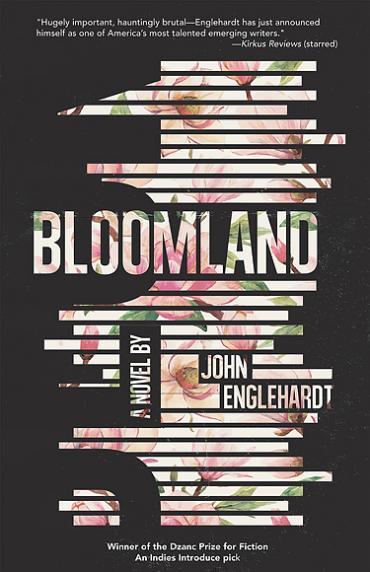 responsibility to find a way to un-glorify violence, to not elevate the offender to the status of an anti-hero. And this is really difficult, especially considering all the stories we have that implicitly buy into the idea that the only recourse for a man ‘wronged by society’ is rage. I think we have to seriously ask ourselves: to what extent does a story (irresponsibly) present violence as cathartic and liberating, rather than compassion and the hard work of finding oneself?”
responsibility to find a way to un-glorify violence, to not elevate the offender to the status of an anti-hero. And this is really difficult, especially considering all the stories we have that implicitly buy into the idea that the only recourse for a man ‘wronged by society’ is rage. I think we have to seriously ask ourselves: to what extent does a story (irresponsibly) present violence as cathartic and liberating, rather than compassion and the hard work of finding oneself?”
Bloomland was published in September 2019, but John is already researching his next book. Although it is currently “a heap of disparate ideas and life experience,” John admits, “There is probably enough death in Bloomland for my entire literary career. I think it will be good for me to write about something else.”
In addition to undertaking his new and tentatively cheerier literary project, John hopes to consolidate his skills and life experiences in order to teach writing at the university level and return to the academic community after his last five years of post-MFA adventures.
Student and Faculty Awards
English Department Students and Faculty were the recipients of a number of prestigious College of Arts and Sciences and University awards in 2018-2019:
English and Environmental Studies major Kennedy Dresh received the 2019 Hickey Award, given to an outstanding graduating student of the College of Arts and Sciences. Hickey award winners are presented with a medal at the Arts and Sciences Undergraduate Awards Ceremony and also have the privilege of leading their class in the processional at graduation. Selection is based upon the student's total contribution to academic life and is made by the department chairs and program directors of the College. The award honors the memory of Dr. Richard P. Hickey, professor of English, a beloved and respected teacher at Seattle University from 1947 until his death in 1968.
In English, Amanda Fawcett, Andy Havens, and Margaret Roberts received the Program’s McDonald Award. It is named in honor of former chair and distinguished professor Fr. Alex McDonald, S.J., and is presented to the graduating student with the highest GPA in the major.
In Film, Brandon Bassler, Amy Williams, and Barbara Hoffman received the Program's McDonald Award. It is named in honor of former chair and distinguished professor Fr. Alex McDonald, S.J., and is presented to the graduating student with the highest GPA in the major.
Dr. Charles Tung received the 2019 College of Arts and Sciences Outstanding Scholarship Award. The Outstanding Scholarship Award provides the occasion for the College to recognize the publication of a book, the production of a creative work, or the publication of a series of articles by a colleague that scholars in her or his discipline judge as representing a significant contribution to the field. Dr. Tung’s book, Modernism and Time Machines, was published in 2019. The selection committee for this award noted that in addition to this monograph, Dr. Tung has published 11 peer-reviewed publications, delivered seven invited talks and papers (including two keynotes in 2017), and 25 conference papers, and has organized 12 conference panels and has offered 16 public presentations at SU. Beyond his more traditional scholarship, Dr. Tung has served over the last two years as the Principal Investigator and Director of The Study of the US Institute on Contemporary American Literature (SUSI).
Student and Alumni News
Nick Stinehour (2019) presented a paper co-written with Olivia Roussell (2019) and Tara De Bortnowsky (2019) titled “Spill the Communitea: The Role of the Mentoring Process in Enhancing Community” at the Pacific Northwest Writing Center Association Conference in April 2019.
Sena Crow (2019) and Tara De Bortnowsky (2019) participated in a Roundtable, “Can Universities be Decolonial Partners? Lessons Learned from Intercultural, Intergenerational, Transdisciplinary Scholarship” proposed by Professors Serena Cosgrove and Christina Roberts at the 2019 Native American and Indigenous Studies Association Annual Meeting at the University of Waikato in Hamilton, Aotearoa/New Zealand in June.
Ivy Jong, Emily Boynton, Caroline Craighead, Mina Gibbs, Mary Lawrence, Sydney Haas, and Emily Brown published a collaboratively-written theater review of upstart crow collective’s 2018 production of Richard III in the scholarly journal Early Modern Culture. Their review, “The Making of a Tyrant,” emerged out of Dr. Allison Machlis Meyer’s Fall 2018 Special Topics English class, Early Modern Drama on the Modern Stage, which studied local, all-femme performances of Shakespeare’s plays. Upstart crow collective’s production was directed by Seattle U’s own Professor of Theatre, Rosa Joshi. You can read their review here.
Joseph Cheatle (2006) graduated from English with Departmental Honors (and also did Honors History and the University Honors Program). He started working in writing centers at Miami University where he worked as a graduate consultant in the Howe Writing Center. He is now the Director of the Writing and Media Center at Iowa State University. Along with his administrative team, he supervises nearly 60 employees and four writing center locations. They also offer workshops and writing retreats for students. He is currently working on my own book about writing center studies and has works published in The Journal of Writing Analytics, Praxis: A Writing Center Journal, and WLN: A Journal of Writing Center Scholarship.
William Hughes graduated from Seattle University in 2007 with a B.A. in English and a minor in Women Studies. He recently received his Ph.D. in English from the University of California, Davis, after earning his M.A. at Fordham University. He is currently a lecturer at UC Davis where he teaches classes on the history of the novel, Victorian serial fiction, and 19th century women writers.
Josie McDonell (2019) will be attending NYU’s Gallatin School of Individualized Study to pursue a Master of Arts in English Literature, Journalism, and Music.
Grace Goodwin, an English major and University Honors alum, will be attending Columbia University for a Master’s degree in Journalism.
Recent graduate Natalie Jaech is starting a graduate program in literature at Mills College this coming fall.
Hannah Poole (2019) participated in a 2019 Columbia University Publishing Course, a rigorous six-week summer program that prepares its students for a career in publishing.
Faculty News
Charles M. Tung began his three-year term as department chair. His article “The Angel of Alternate History,” appeared in Apocalypse, special issue of ASAP/Journal, in fall 2018, and his book Modernism and Time Machines appeared in spring 2019 in the the Critical Studies in Modernist Culture series at Edinburgh University Press. In the fall, he co-organized the “Paleofuturism” roundtable at the ASAP/10 Conference at Tulane University, presented a paper in a different session of the same conference on “’The Mathematician and the Image-Maker’: Vilem Flusser’s Medium Historicity,” and in the spring, he was invited to the Rice University Humanities Research Center: Thinking Media After Flusser Symposium, where he gave a paper called “Historical Time and Virality after Vilem Flusser.” Please feel free to send me an email!
Dr. Molly Clark Hillard published an essay titled “Never Let Me Go: Cloning, Transplanting and the Victorian Novel” in the Journal of Narrative Theory. She has two other projects forthcoming: an essay on the intersections between Victorian fairy tales and contemporary human rights failures, and a special issue of Victorian Literature and Culture co-edited with her collaborator Nathan Hensley (Georgetown U). This year, she presented papers in St. Petersburg, FL and Victoria BC. This fall, she will present a paper in Columbus, OH. Dr. Hillard continued her work as Chief Faculty Editor of the Seattle University Undergraduate Research Journal, SUURJ, and launched SUURJ’s Vol. 3 with another dedicated team of students, faculty, and administrators. She completed her second year of coordinating English Departmental Honors, working with another amazing cohort of seniors completing honors theses. She also served in her second year as Director of the Student Research Program for the university, which administers research grants and coordinates SUURA, the undergraduate research conference. Dr. Hillard was delighted to receive the College of Arts and Sciences Summer Faculty Fellowship, in support of her current book project. This year, Dr. Hillard is on sabbatical, where she is at work on her second book project, on the intersections of Victorian and contemporary literatures.
Professor Alex Johnston's film Evidence of the Evidence, which premiered at the 2018 Berlinale, continued its successful festival run. Most notably, the film won best documentary at the London Short Film Festival and the Tolpuddle Radical Film Festival. Closer to home, in April Dr. Johnston programmed a screening of short media works at the Northwest Film Forum entitled, "Experiments In Resistance: Experimental Media in the Age of Mass Incarceration." In May, he presented a paper at the bi-annual Poetics + Politics Documentary Research Symposium, entitled "'The Scene of No Crime': history beyond (Hi)Story."
Dr. June Johnson Bube’s article “Reframing Communication from a ‘Message Delivery Stance” to a “Listening/Learning Stance’: Developing a Collaborative Rhetoric Pedagogy as Preparation for Civic Engagement” will appear in the spring 2020 volume of the Journal of Teaching Writing, a major publication in writing studies. This article seeks to shift the national disciplinary conversation on argumentation—in this moment of fractured, distorted public discourse—by constructing a robust theory and praxis of collaborative rhetoric (historically simply a subset or strategy of formal argumentation). Drawing on theories from psychology, rhetoric, and conflict resolution, Johnson offers new principles to suit rhetorical situations involving conflict where persuasion is not the goal. Newly synthesized theory and models of course and assignment design develop her claim that facility with collaborative rhetoric is needed for responsible, ethical civic engagement.
Dr. María Bullón-Fernández wrote an entry on one of the pilgrims in Chaucer's Canterbury Tales, the Clerk, for The Chaucer Encyclopedia, edited by Richard G. Newhauser. Scheduled to appear before the end of this year, this Encyclopedia will be published in 4 volumes in print and also online by Wiley-Blackwell and will comprise over 1390 entries with ca. 1 million words. She was also invited to participate in two panels at the 54th International Congress on Medieval Studies at Western Michigan University. The first presentation, "Transgressions," discussed the impact of the publication of a groundbreaking book, Amoral Gower, in 2001; the second one, "Teaching Gower and Medieval Sexualities," focused on her experience teaching the Confessio amantis in the context of a course she teaches at SU on sexualities in medieval literature and contemporary queer theory. Among various service responsibilities, she is currently co-chairing the Arts and Sciences Strategic Planning Committee.
Dr. Bryn Gribben had two poems and a creative nonfiction essay published this year. The poem "Tail-isman" appeared in volume 2, issue 1 of Montana Mouthful, while "The Siamese Twins Have Sex, or Thank You, Harry Houdini" appeared in the online journal Coffin Bell 2.3. Her creative nonfiction essay "Message in a Bottle" was published in the August online issue of The Bookends Review. Gribben has a third poem, "Glore Psychiatric Museum: St. Joseph, Missouri," forthcoming in the October issue of The Perch, a literary journal of mental health out of Yale.
Professor Juan Carlos Reyes debuted this September an art exhibit that he curated on behalf of La Sala (a Seattle-based Latinx arts organization). Entitled “The Concentration Camp,” the installation ran through October 9th, the duration of Latinx Heritage Month, at the Nepantla Cultural Arts Gallery in White Center, Seattle. The interactive exhibit combines texts, audio pieces, and short films to contextualize the U.S. border crisis. At the heart of the exhibit is the testimony he has compiled from children, women, and men who have been placed into migrant detention centers across the country. The goal of the exhibit is to contextualize present history, to offer a place for observers to sit with these stories and, in turn, have these stories sit with them.
Dr. Allison Machlis Meyer contributed a paper, “Regional Strategies, Transnational Vocabularies: upstart crow collective and Women’s Shakespeare in Seattle” to the “Shakespeare on the Contemporary Regional Stage” seminar at the Shakespeare Association of America Meeting in March. Dr. Meyer had an essay on teaching all-femme Shakespeare in Seattle accepted for publication this year, and she was invited to contribute another essay to a special journal issue on the topic of Regional Shakespeare. She will also present a paper as part of the (Re)imagining Early Modern Anglo-Arab Encounters Roundtable at the Modern Language Association Annual Meeting in January. Dr. Meyer’s monograph on royal women in early modern historiography is forthcoming next year with University of Nebraska Press.
Professor Joshua Wilson was the 2019 Scholar-in-Residence at Rhodes University in Makhanda, South Africa this past summer. His new writing has appeared recently in Poetry, Tin House, The Believer, and The Iowa Review. His small press, Letter Machine Editions, will release a new book by Fred Moten in October.
Dr. Kirsten Moana Thompson published "The Colour Revolution: Disney, DuPont and Faber Birren" in issue 32 of Cinéma & Cie International Film Studies Journal. She has edited, with Malcolm Cook, a forthcoming book, Animation and Advertising: Art, Commerce, Persuasion and Appeal, which will be published by Palgrave this fall.
Dr. Susan Meyers published an essay in the spring issue of Creative Nonfiction, and she is spending this fall at two residencies, one at the Monson Art Center and a second at the Virginia Center for the Creative Arts.
Dr. Mary-Antoinette Smith’s "new" global humanities UCOR 3400 version of “The London Eye: Engaged Gazing for Social Justice Abroad in Britain” was a great success this past summer. Non-humanities majors from Nursing and Science and Engineering took this course and engaged in themes related to immigration, refugee challenges, militant women's suffrage, and social justice activism, and it was fun to have a graduate from our department, Emzi Miller (formerly Mark Miller, Class of 2013) audit the course, as well as one WGST major and one Communication/Journalism major. Dr. Smith also had a chapter, "Of Human Bondage: Recurrent Replications of Supplication, Enslavement, and Appeal from Antiquity through the Nineteenth Century" accepted for publication in an edited volume titled Adaptation Before Cinema: Literary and Visual Convergence from Antiquity through the 19th Century (Eds. Lissette Lopez Szwydky and Glenn Jellenik) which will be submitted for publication in Palgrave's Visual Culture Series.
Dr. Nalini Iyer co-chaired the annual South Asian Literary Association (SALA) conference in Chicago in January 2019. She was recently appointed Editor-in- Chief of South Asian Review, the journal of SALA, published by Taylor & Francis. She is the first woman to be appointed Editor by the journal, which has been in publication continuously for forty years.
Dr. Sean McDowell 2019 has been a particularly busy year on the scholarship front for Dr. Sean McDowell. Since 2013, he has worked as part of a team of scholars from the U. S., Canada, Switzerland, France, Japan, and the U. K. on two volumes of The Variorum Edition of the Poetry of John Donne. Hailed as one of the “most ambitious and valuable collaborative scholarly enterprises” of the past fifty years, the Variorum has received more than $225,000 in grant funding from the National Endowment for the Humanities since 1986. Indiana University Press has just published the first volume that McDowell worked on, vol. 5: The Verse Letters, a hefty tome weighing in at 1370 pages. For this volume, McDowell and six other textual editors under the leadership of Gregory Kneidel (University of Connecticut) collated, filiated, and edited all seventeenth-century manuscript and print witnesses of Donne’s forty-two surviving verse letters to reconstruct as best as possible Donne’s lost original holographs and provide a comprehensive textual history of each poem. In addition to the freshly edited poems and a detailed textual analysis and apparatus for each one, the volume also includes an exhaustive critical commentary of all the scholarship and printed remarks on the verse letters from the seventeenth century until 2011, the cut-off date for this volume. The next volume Sean worked on, vol. 7.2: The Divine Poems, is scheduled to appear in 2020.
In other news, McDowell was a co-recipient of the Distinguished Publication Award from the John Donne Society for John Donne and Contemporary Poetry, ed. Judith Scherer Herz (Palgrave, 2017). He also published an essay on “Urban Marvell” in The Oxford Handbook of Andrew Marvell, ed. Edward Holberton and Martin Dzelzainis (Oxford University Press) and an essay on “The Sonnet Made New in George Herbert’s The Temple” in volume 22 of Scintilla: A Journal of Literary Criticism, Prose, and New Poetry in the Metaphysical Tradition. Meanwhile, he edited volume 35 of the peer-reviewed John Donne Journal, which is just out. On the creative front, The Lyric published one of his most recent poems, “Connemara Village,” in its summer issue. Finally, in February, he was elected Second-Vice President of the John Donne Society, which means he will give the presidential address at 2021 conference and serve as President of that society in 2021-2022.
Subtext Editorial Team
Editor-in- Chief: Dr. Allison Machlis Meyer
Managing Editor and Web Design: Shawn Bell
Send Us Your News
Send SubText
